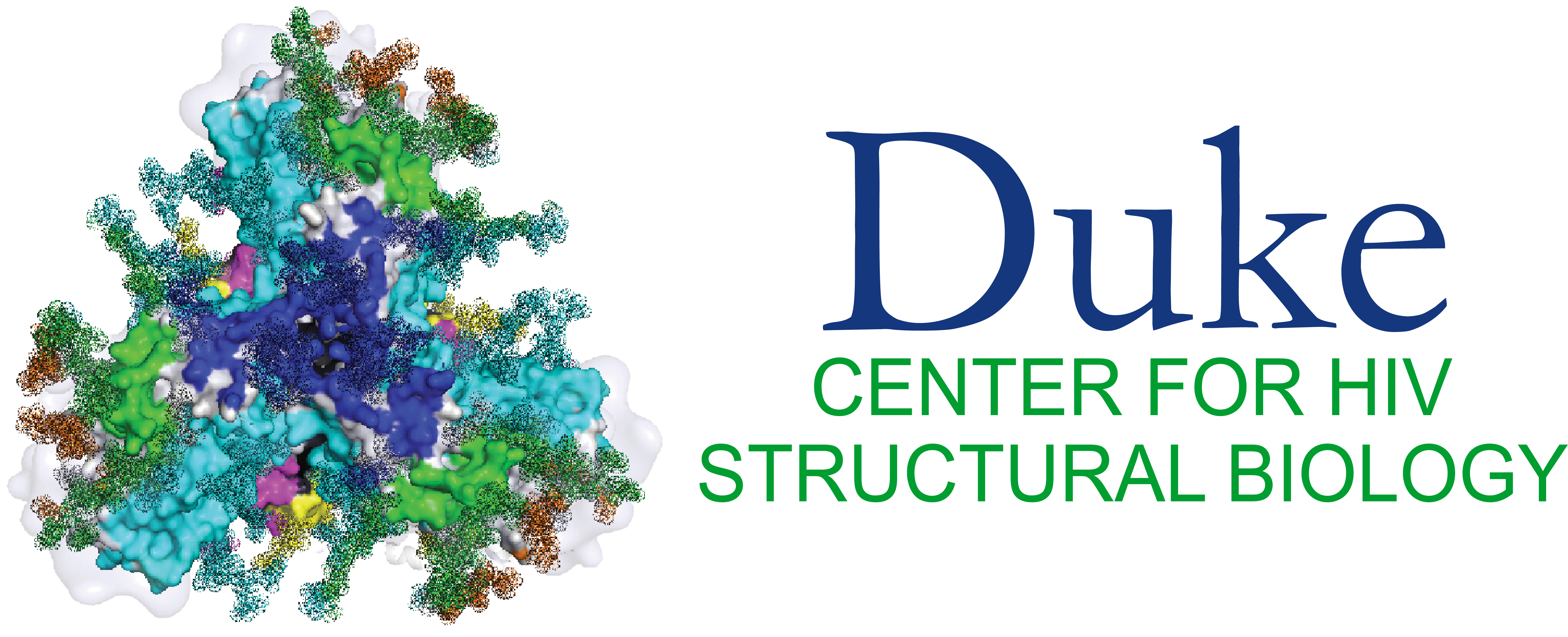Collaborative Development Awards
Please submit applications for Collaborative Development Awards by November 1, 2025
Overview
The Duke Center for HIV Structural Biology (DCHSB) invites proposals for an HIV research funding opportunity (Collaborative Development Awards - CDA). The program is intended to broadly support HIV-related structural studies (including structural biology, molecular biophysics, structural bioinformatics, and others) aligned with the goals of the Center.
Award Information
- Proposals must include a detailed budget up to $175,000 (in total costs) based on scope of work proposed. Depending on the number of meritorious applicants and their budgets, the Review Committee will determine how many total proposals will be funded. Funds can be used to cover salary support and other research-related expenses.
- The project plan should be accomplished within one year from date of award. For new applications, the funding period is April 1, 2026 - March 31, 2027, with no option for extension. Proposals should include a clear timeline and plan for completion.
Eligibility Criteria
- Early-career HIV investigators who have completed their terminal research degree or end of post-graduate clinical training, whichever date is later, within the past 10 years, and who have not previously competed successfully as PD/PI for a substantial NIH independent research award (R01 or similar) and investigators new to HIV research are eligible to apply for the Collaborative Development Awards.
- Preference will be given to applicants outside the Duke Center for HIV Structural Biology.
- In the period preceding the application due date, candidates will submit an eligibility form, obtained through the Duke Center for HIV Structural Biology website, that lays out their years as an early investigator and/or new to the field, sub-specialty and institution, proposed mentor and topic of research.
- Early-career investigators are encouraged to select research mentors who are NIH-funded investigators with proven expertise in the area of research interest and in the career development of independent investigators.
Project Details
- One of the goals of the CDA awards is to actively seek candidates who can bring additional technologies to complement the expertise of the structural biology toolbox. These will include spectroscopic techniques such as nuclear magnetic resonance (NMR) spectroscopy, single-molecule fluorescence resonance energy transfer (sm-FRET) and electron paramagnetic resonance (EPR) spectroscopy. NMR, smFRET and EPR have been used successfully to understand HIV-1 Env structure and dynamics. Projects in any area, including basic, computational, clinical or translational research, will be considered.
- Work on structure-based vaccine or antibody development that does not necessarily include the determination of new structures, but uses available structural information as part of the development process, will be considered.
- Prior to start of any research, appropriate human subjects and/or animal certifications will be required.
Application Process
Applications should be written by the candidate, as an R21-style research plan in the requested format and contain all the items listed below:
- Cover Sheet
- Personal Statement
- Project Abstract
- Key Personnel
- Biographical sketches for candidate and mentor
- Facilities/Resources
- Specific Aims
- Research Strategy (6-page limit)
- References
Application Form
Download the Application (an editable .doc file), and save your final version to submit as a PDF file.
Submission Form
Submit your application here along with the following completed PDF documents;
- RR_Detailed Budget Sheet (not to exceed $175,000 in total costs)
- Budget Justification
- Signed PHS2590 Face Page
Deadline for CDA Submission is November 1, 2025
Review Process
- Your application will be peer-reviewed by a panel convened by the Center’s investigators. Selection Committee members will evaluate key criteria for each applicant: a) quality of the research project; b) anticipated quality of career guidance and mentoring by the sponsoring department and research mentor; c) academic stature of the proposed research mentor; d) applicant’s understanding and appreciation of the relationship of the proposed research to a high-priority question in HIV biology; e) applicant’s long-term scientific goals; and f) applicant’s intellectual curiosity, thoughtfulness, perseverance, and personal academic achievement. We intend to complete reviews and start funding by April 1, 2026.
- To assess the progress of the funded projects, each awardee will be required to submit quarterly one-page progress reports and to present the progress of the project during the DCHSB annual meeting.
- Each awardee is expected to present at 3 DCHSB meetings in 2026:
- The DCHSB Scientific Advisory Board Meeting on March 27th.
- The DCHSB Annual Meeting in May 28-29.
- The NIH HIV Structural Biology Center's meeting in June 22-23.
Please budget some of your CDA funds for travel to Duke University (Durham, North Carolina) twice and to NIH (Bethesda, Maryland.)
Confidentiality
The DCHSB and the review panel will endeavor to maintain the confidentiality of all applicant intellectual property.
Project Contact
For questions regarding these proposal guidelines, eligibility requirements, review criteria, or other information related to this award, please contact:
Aaron Cook PhD
Scientific Program Leader
Maria Blasi, PhD
Lead Developmental Core
Jason McLellan, PhD
Co-Lead Developmental Core
Ivelin Georgiev, PhD
Co-Lead Developmental Core
